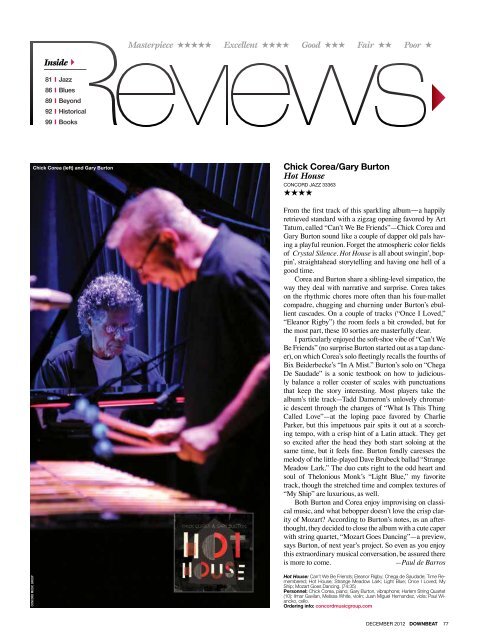Ron Carter Esperanza Spalding - Downbeat
Ron Carter Esperanza Spalding - Downbeat
Ron Carter Esperanza Spalding - Downbeat
Create successful ePaper yourself
Turn your PDF publications into a flip-book with our unique Google optimized e-Paper software.
Masterpiece ★★★★★ Excellent ★★★★ Good ★★★ Fair ★★ Poor ★<br />
Inside <br />
81 I Jazz<br />
86 I Blues<br />
89 I Beyond<br />
92 I Historical<br />
99 I Books<br />
Chick Corea (left) and Gary Burton<br />
Chick Corea/Gary Burton<br />
Hot House<br />
Concord Jazz 33363<br />
HHHH<br />
From the first track of this sparkling album—a happily<br />
retrieved standard with a zigzag opening favored by Art<br />
Tatum, called “Can’t We Be Friends”—Chick Corea and<br />
Gary Burton sound like a couple of dapper old pals having<br />
a playful reunion. Forget the atmospheric color fields<br />
of Crystal Silence. Hot House is all about swingin’, boppin’,<br />
straightahead storytelling and having one hell of a<br />
good time.<br />
Corea and Burton share a sibling-level simpatico, the<br />
way they deal with narrative and surprise. Corea takes<br />
on the rhythmic chores more often than his four-mallet<br />
compadre, chugging and churning under Burton’s ebullient<br />
cascades. On a couple of tracks (“Once I Loved,”<br />
“Eleanor Rigby”) the room feels a bit crowded, but for<br />
the most part, these 10 sorties are masterfully clear.<br />
I particularly enjoyed the soft-shoe vibe of “Can’t We<br />
Be Friends” (no surprise Burton started out as a tap dancer),<br />
on which Corea’s solo fleetingly recalls the fourths of<br />
Bix Beiderbecke’s “In A Mist.” Burton’s solo on “Chega<br />
De Saudade” is a sonic textbook on how to judiciously<br />
balance a roller coaster of scales with punctuations<br />
that keep the story interesting. Most players take the<br />
album’s title track—Tadd Dameron’s unlovely chromatic<br />
descent through the changes of “What Is This Thing<br />
Called Love”—at the loping pace favored by Charlie<br />
Parker, but this impetuous pair spits it out at a scorching<br />
tempo, with a crisp hint of a Latin attack. They get<br />
so excited after the head they both start soloing at the<br />
same time, but it feels fine. Burton fondly caresses the<br />
melody of the little-played Dave Brubeck ballad “Strange<br />
Meadow Lark.” The duo cuts right to the odd heart and<br />
soul of Thelonious Monk’s “Light Blue,” my favorite<br />
track, though the stretched time and complex textures of<br />
“My Ship” are luxurious, as well.<br />
Both Burton and Corea enjoy improvising on classical<br />
music, and what bebopper doesn’t love the crisp clarity<br />
of Mozart? According to Burton’s notes, as an afterthought,<br />
they decided to close the album with a cute caper<br />
with string quartet, “Mozart Goes Dancing”—a preview,<br />
says Burton, of next year’s project. So even as you enjoy<br />
this extraordinary musical conversation, be assured there<br />
is more to come. <br />
—Paul de Barros<br />
concord music group<br />
Hot House: Can’t We Be Friends; Eleanor Rigby; Chega de Saudade; Time Remembered;<br />
Hot House; Strange Meadow Lark; Light Blue; Once I Loved; My<br />
Ship; Mozart Goes Dancing. (74:35)<br />
Personnel: Chick Corea, piano; Gary Burton, vibraphone; Harlem String Quartet<br />
(10): Ilmar Gavilan, Melissa White, violin; Juan Miguel Hernandez, viola; Paul Wiancko,<br />
cello.<br />
Ordering info: concordmusicgroup.com<br />
DECEMBER 2012 DOWNBEAT 77
















